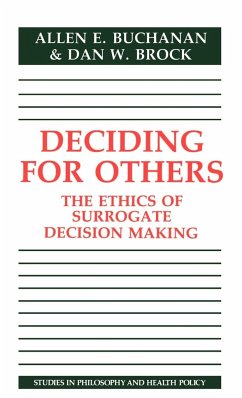This book is the most comprehensive treatment available of one of the most urgent - and yet in some respects most neglected - problems in bioethics: decision-making for incompetents. Part I develops a general theory for making treatment and care decisions for patients who are not competent to decide for themselves. It provides an in-depth analysis of competence, articulates and defends a coherent set of principles to specify suitable surrogate decisionmakers and to guide their choices, examines the value of advance directives, and investigates the role that considerations of cost ought to play in decisions concerning incompetents. Part II applies this theoretical framework to the distinctive problems of three important classes of individuals, many of whom are incompetent: minors, the elderly and psychiatric patients. The authors' approach combines a probing analysis of fundamental issues in ethical theory with a sensitive awareness of the concrete realities of health care institutions and the highly personal and individual character of difficult practical problems. Its broad scope will appeal to health professionals, moral philosophers and lawyers alike.
Table of contents:
Preface; Introduction; Part I. Theory: 1. Competence and incompetence; 2. The primary ethical framework: patient-centered principles; 3. Advance directives, personhood, and personal identity; 4. Distributive justice and the incompetent; Part II. Application: 5. Minors; 6. The elderly; 7. The mentally ill; Looking forward; Appendix 1: living trust and nomination of conservatorship; Appendix 2: durable power of attorney for health care; Notes; Index.
This book is the most comprehensive treatment available of one of the most urgent - and yet in some respects most neglected - problems in bioethics: decision-making for incompetents. The authors' approach combines a probing analysis of fundamental issues in ethical theory with a sensitive awareness of the concrete realities of health care institutions.
This book is the most comprehensive treatment available of one of the most urgent problems in bioethics: decision-making for incompetents.
Hinweis: Dieser Artikel kann nur an eine deutsche Lieferadresse ausgeliefert werden.
Table of contents:
Preface; Introduction; Part I. Theory: 1. Competence and incompetence; 2. The primary ethical framework: patient-centered principles; 3. Advance directives, personhood, and personal identity; 4. Distributive justice and the incompetent; Part II. Application: 5. Minors; 6. The elderly; 7. The mentally ill; Looking forward; Appendix 1: living trust and nomination of conservatorship; Appendix 2: durable power of attorney for health care; Notes; Index.
This book is the most comprehensive treatment available of one of the most urgent - and yet in some respects most neglected - problems in bioethics: decision-making for incompetents. The authors' approach combines a probing analysis of fundamental issues in ethical theory with a sensitive awareness of the concrete realities of health care institutions.
This book is the most comprehensive treatment available of one of the most urgent problems in bioethics: decision-making for incompetents.
Hinweis: Dieser Artikel kann nur an eine deutsche Lieferadresse ausgeliefert werden.








